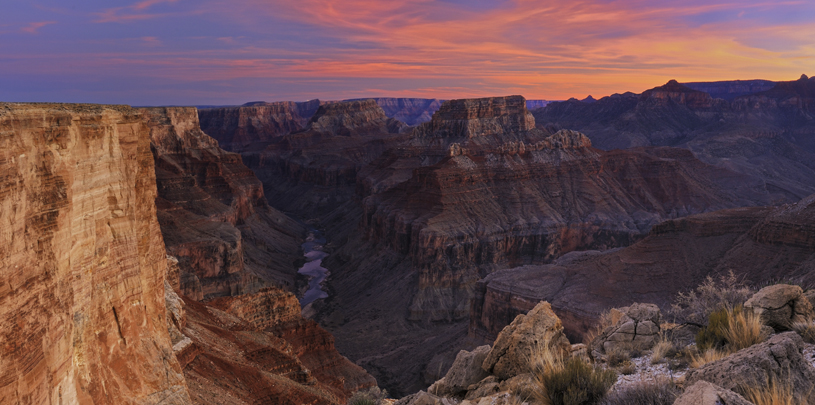
by Amber Reimondo, Energy Director
As the midterms approach, voters in the Grand Canyon state may disagree about politics, social issues, and the economy, but there are at least two things that unite Arizonans across the state, and across party lines: protecting the clean water supply and protecting the Grand Canyon.
These shared values are especially clear when it comes to opposing mining radioactive uranium on national forest and other federal public lands near Grand Canyon National Park, according to a poll released earlier this month.
Pollsters found that two out of three Arizonans support a bill to permanently ban new uranium mines in the Grand Canyon region (a temporary 20-year ban was put in place in 2012, when thousands of new mining claims threatened the region, and is set to expire in 2032). Tribes, including the Navajo Nation and the Havasupai Tribe, have long established that they strongly support a permanent ban.
Washington, D.C.-based independent research firm GQR conducted a telephone survey of 600 Arizona voters to study public opinion about Grand Canyon protection. Most voters polled — a whopping 96 percent — said it is important to protect the state’s clean water supply with 91 percent saying it is very important, including 95 percent of Democrats and 89 percent of Republicans. Amid drought, the changing climate, the stark reality of a drier Southwest and shortages of Colorado River water, it's no surprise that concern about preserving clean water is close to universal.
The poll also found that two out of three (67 percent) Arizona voters support the Grand Canyon Protection Act, which would make permanent the temporary ban on new uranium mining. Only 15 percent of voters oppose the permanent ban and strong support for a permanent ban extends across the political spectrum with 87 percent support among Democrats and 69 percent among Independents. More than twice as many Republicans support the ban than oppose it, the poll found.
Public support for a permanent ban on new uranium mines near the Grand Canyon aligns with the views of many tribal leaders as well. Tribal communities have paid the ultimate price for past uranium mining, as abandoned uranium mines and mills have poisoned water and sickened many.
"Here on the Navajo Nation, over 500 open uranium mines are still being cleaned up. And the cancer rates are high...that’s probably why you see bipartisan support for this ban," said Navajo Nation President Jonathan Nez.
The Havasupai Tribe, whose members have lived in the Grand Canyon since time immemorial, has opposed uranium mining in the region since the 1980s. "Uranium mining needs to be stopped in the Grand Canyon," affirmed Stuart Chavez, a member of the Havasupai Tribal Council.
The Grand Canyon Protection Act would permanently ban new uranium mines on about 1 million acres of federal public lands near the Grand Canyon. Since it was first introduced by Rep. Raúl Grijalva, D-AZ, it has passed the House several times, most recently in July 2022, as part of the National Defense Authorization Act, but the path to making a permanent Grand Canyon mining ban the law of the land has been rockier in the Senate. Senators Mark Kelly, D-AZ, and Kyrsten Sinema, D-AZ, introduced a Senate version in early 2021, but as Congress confronted urgent national priorities, including the pandemic, the bill sat there for more than a year.
On July 28, 2022, the Senate Committee on Energy and Natural Resources finally gave the bill a markup and the subsequent vote split 10-10 along party lines, the farthest the legislation has yet to advance in the Senate. Next, Senate leadership must send it to the full Senate, where it will have the best chance of inclusion in one of the increasingly limited bills or legislative packages Congress will have time to prioritize and pass between now and the end of the year.
This recent poll shows that Arizona voters want a permanent ban. Will Senators Sinema and Kelly continue on and lobby their colleagues in the Senate and do everything in their power to honor the wishes of tribes, as well as the vast majority of Arizonans, to protect the Grand Canyon region from new uranium mines, forever? We really hope so.
ABOUT THE BILLS
H.B. 1052, the House version of the Grand Canyon Protection Act ›
S. 387, the Senate version of the Grand Canyon Protection Act ›
A small victory in the legal case challenging Daneros uranium mine, near Bears Ears National Monument.
Read MoreGroundwater pumping at a uranium mine near the Grand Canyon will affect the canyon's springs, scientists says.
Read MoreA rally in Salt Lake City followed by a spiritual walk in White Mesa demonstrate the Ute community's determination to see uranium mill close.
Read More